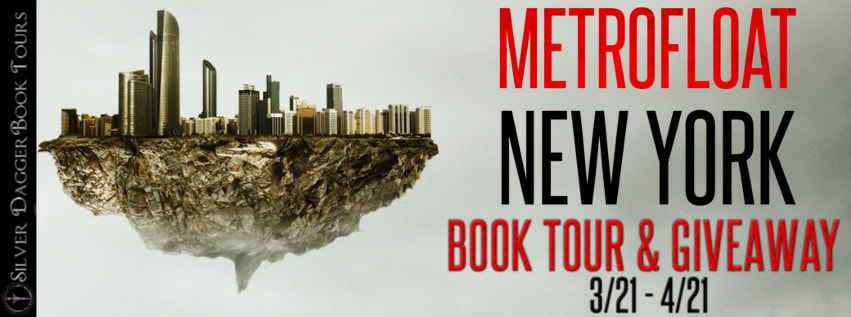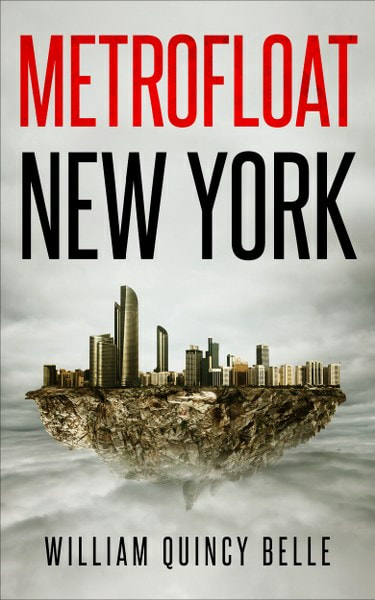Metrofloat New York by William Quincy Belle Book Tour and Giveaway :)
Metrofloat
New York
by
William Quincy Belle
Genre:
Science Fiction
A
Post-apocalyptic Sci-Fi thriller.
Several
hundred years in the future, Earth is a different planet. Antigravity
has been invented and “flying” has given way to “floating”:
giant platforms with cities remain above the growing surface
temperatures as enclaves of the privileged. A global pandemic has
wiped out 80% of those on the ground, and a virulent, flesh-eating
disease, necrofasc, has left most with artificial body parts. Insects
are the main food staple. A utopia for some, a dystopia for
others.
Metrofloat
New York, a futuristic city of thirty million, is run by an oligarchy
of five rich and powerful people. An unknown assassin, working from
within the system, attempts to seize control and declare himself
dictator by methodically removing all rivals. Detective Matthew Heart
of the Metropolitan Police must deal with his partner, a cyborg
policewoman, his unofficial family, a transgender woman and her
one-legged daughter, and a mysterious assailant bent on taking over
the world by killing anyone who stands in his way.
Prologue
The stars were out. The air was fresh. From the fiftieth-floor
terrace, the muted sounds of the city were a dull roar. Willard
Bachmann, balding but commanding in his sixty-fourth year, moved
along the balustrade, sipping an arti-sour and staring at the vista
before him: to the one side, the skyline of one of Earth’s largest
floating metropolises — Metrofloat New York — and to
the other, a kilometer below, vast desert plains ending in the
silhouette of a distant mountain range. It was all his. He controlled
it. He ruled it. Years of hard work, important decisions, and backroom dealings had
amassed for him an unprecedented amount of power and influence. The
OligCouncil was no longer something he could lead; it was something
he could commandeer and rule. He could bend it to his will. He could
possess it and do with it what he wanted. This was his opportunity. Instead of going through the never-ending
and often useless democratic process of consensus, he could force his
will on everyone. There was no campaigning for buy-in. There was no
vote for agreement. Everyone had to do as he said. Period.
Dictatorship: the fast and easy way to get things done. Willard
chuckled to himself. The word had such a negative connotation. He
would say enlightened absolutism or philosophical
monarchism. He was taking it upon himself to bring people
together, to get them to pull in the same direction, and remove the
self-interest and deindividuation plaguing society. Willard put one hand on the railing and leaned out over the dizzying
height. He held up his glass toward the city panorama and said, “To
you. Together we will be great once again.” He took the last sip of
his drink then turned and walked across the balcony. Slipping through
the open door, he waved his hand over a sensor to close it. Tomorrow
would be a busy day; he needed to sleep. He sauntered across a sizable living area to an open kitchen and set
down his glass. As Willard turned toward the bedroom, a movement
caught his eye. He looked across the expanse of floor to the windows
facing the terrace. The edge of a curtain fluttered. The door leading
to the balcony was open — the door he had shut moments ago. Willard crept around the kitchen island into the living room. He
skirted a decorative shelving unit and moved into the corner, his
work area. Opening a drawer of his desk, he removed a pulsed energy
pistol. The charge indicator showed eighty percent. He held the gun up at arm’s length and scanned the room for any
movement. Nothing. He grasped the handle of a Japanese samurai sword
displayed on the wall, slid it out of its case, and moved from behind
the desk. Willard swept the area and looked behind various pieces of furniture.
He held his breath and listened. From somewhere came the hum of
machinery, electricity, and background noises typical of any building
in the city, but nothing else. To the left, the floor creaked. Willard whirled and fired. There was
a thump followed by the crackling of a fireball against the wall.
Nothing was there. Willard glanced left and right, waving the gun in
preparation for a second shot. His ears became accustomed to the
silence and he remained still, listening for breathing, the shuffle
of a foot, anything. There was nothing but silence. Was anybody
there? The door was open, but he had shut it. He was sure of it.
Since this was the fiftieth floor, whoever came in from the terrace
had chosen an unorthodox way of dropping in unannounced. Willard checked the other half of the room, walking to the far end of
the couch and looking behind it. Nothing. A tiny noise came from his work area in the corner. Turning, he
pointed the pistol in that direction, but it was difficult to see in
the subdued light. He could feel his heart beating. Someone was here.
Someone was waiting for the right moment. As he stared into the corner, trying to discern any movement,
something registered in his peripheral vision. But it was too late. A
hand grabbed the gun and twisted forward while another grabbed his
forearm and twisted backward. Willard had tensed his finger and the
pistol fired at the couch, scorching the fabric. The gun wrenched from his hand, Willard turned toward his attacker
and swung the sword in an arc over his shoulder. The blade hit the
upper arm of the attacker with a thud and buried itself deep in the
limb. There was no blood. Willard’s eyes widened as he realized he
had not cut into human flesh. The assailant tossed the pistol to one side and seized the blade,
pulling upward to remove it from his arm, then back to yank the
handle out of Willard’s hand. He tossed the sword aside, and it
jangled against the floor. Willard leaped and kicked the intruder in
the stomach, causing the assailant to lose his balance and fall
backward. Willard dove for the pistol, twisted around, and took aim.
There was no sign of his attacker. He jumped up and ran back to the couch. Seeing nothing, he spun
around, checking all three hundred and sixty degrees around him. His
heart was racing, his breathing hard. The adrenaline had kicked in,
and both Willard’s hands shook as he tried to steady the gun. “Mr. Bachmann.” The male voice was sonorous. Willard spun toward the sound and fired. He saw part of the man’s
head as he ducked behind a bookcase, just before the fireball
shattered a crystal vase. “Mr. Bachmann,” the voice said, “you’re making this far too
difficult.” Willard moved toward the bookshelf, holding the pistol up with both
hands. “You must face the inevitable. We all have our time, and you, sir,
have had yours.” Willard crouched down, trying to see between the open shelves. “This can be painless, or it can be painful.” Willard aimed between two shelves, over the top of a line of books.
His hands were shaking, and his aim was off. The charge sputtered
against the spines and a wisp of smoke curled up. He ran to the side of the bookcase and spun around behind it, yet saw
no one. Wondering what to do next, Willard heard a step to his right.
He fired. The discharge sizzled in the middle of the man’s chest
and singed his shirt. It did not stop him. The attacker grabbed Willard’s right arm at the wrist, held it over
his head, then seized him by the throat and squeezed. “Please drop the gun, Mr. Bachmann.” The two men held each other’s gaze until Willard let go of the
pistol, which fell to the floor with a clatter. “Thank you.” The attacker pushed Willard across the room into a
straight-backed chair. He snapped restraining devices in place,
locking each wrist to an arm of the chair. Willard looked at his adversary’s arm but could no longer see the
cut from the sword. “Auto-regen. I’ve heard of it but didn’t
think it had yet been perfected for the market.” “If you know the right people and have the money, anything is
possible.” The man uncoupled a tubular device from his belt and
fiddled with the controls. “Do I get a cigarette? A last meal? A final request?” “This won’t hurt, Mr. Bachmann. Well, I’ve been given to
understand it doesn’t hurt, but does anybody know for sure?” Willard gave a warped smile. “Nobody who’s undergone the
procedure has ever complained. Then again, they’re too dead to
speak up.” His opponent leaned over and pressed the device to Willard’s
forehead. “Stop!” Straightening, the man looked at him. “Yes?” “I don’t suppose anything I say will persuade you not to do
this?” “I’m afraid not.” “Money? Power? A job in my organization?” “Please, Mr. Bachmann, my motives are of a higher calling.” “Ah, yes, a true believer.” “I am merely a reflection of your beliefs.” Willard gave a sigh of resignation. “I wanted to sweep away the
past and bring everyone together: the vision of a harmonious future.” “That’s your future, sir. That’s your vision. It’s harmonious
in that people accept you on top with everything and everybody else
at the bottom, having just enough to get by.” “Harmony brings something for everyone. There will be inequities in
life. However, the fighting that results from people not accepting
that truth is the problem. Do you want war? Do you want continued
conflicts between various groups vying for authority? Stopping me
won’t stop the system. Society is hierarchical. You can’t escape
it.” Willard gave his foe a pleading look. “Let us begin,” the man said. Willard sat up straight and shut his eyes in resignation. “Okay.” The man again leaned in and put one end of the tube against Willard’s
forehead. He pushed a button and the device hummed. A readout on one
side counted out a percentage, starting at zero. The man looked
around the room and, from time to time, glanced at the meter. When
the number hit ninety-five he stared at the results, keeping his
thumb poised over a switch. The meter hit one hundred percent. “Goodbye, Mr. Bachmann.” The stranger pressed the button and kept
the device held against Willard’s forehead. There was a crunch
followed by a slurping sound. Willard spasmed, all his limbs shaking
at once. The man watched a long glass container within the device
fill up with a viscous fluid. The counter showed a percentage once
again, and when it hit one hundred the man removed the device,
exposing a hole the width of an index finger in Willard’s forehead.
The spasms stopped and Willard became limp, his head slumping forward
onto his chest. The man recoupled the device to his belt and removed the restraints
from Willard’s wrists. He picked him up and crossed the living
area, stepping sideways through the door, with the body lengthwise,
onto the terrace. The man followed the balustrade to the far side
overlooking the plains. He looked over the rail. The building was
right on the edge of the metrofloat: the perfect spot. He lifted Willard up over the railing and let go before leaning over
to watch as the body fell past fifty stories and disappeared into the
blackness. With the city floating at an altitude of one kilometer, it
would take Willard’s body approximately fifteen seconds to hit the
ground.
***
Alan and Terry were skinny enough to slip through the security
perimeter into the antigravity zone. Already, they heard the pounding
of the AG machines. Workers in the area often wore ear protection, as
the constant noise could damage their hearing, but when one is young
and foolish, protection is for wimps. They climbed down to the lowest
scaffolding and looked out over the panorama below. The ground was a
good kilometer down, speckled with the twinkling lights of the
settlement. Each light was a potential target for a jump-and-grab, so
tonight looked to be an excellent opportunity. Rumors had been circulating around the high school for over a year
about thrill seekers doing the unthinkable: bungee jumping from the
metrofloat. Alan and Terry had pooled their money and bought the
latest in equipment, including a controllable elasticized cable, a
double safety ankle harness, and a precision-positioning system with
automatic height detection. The flexible anchor allowed them to set
up the bungee in any location in record time, so they could get in,
jump, and get out before the authorities knew they were violating
restricted areas. In the last few months, they had brought along groupies of the
informal thrill seekers club, and because of those witnesses, the two
of them had become underground heroes. Who in their right mind would
do such a thing? Tangible proof was good for their reputation, so
they brought things up from their jumps. Over open land, they
returned with a rock or a plant, but the real fun was over settled
areas. So far, they had taken pieces of clothing drying on lines,
things on outdoor tables, and toys and tools left out. Tonight they
wanted to go an extra step and steal a village marker. The other
items could come from anywhere, but a sign showing the name of the
community would prove they had jumped over a settlement. By using the
max extension on the cable, they hoped to remain down long enough to
use their tools to unfasten a sign from its support. Alan would make the first attempt. He had decked himself by attaching
various tools to his belt and wearing a helmet with a lamp. He had
double-checked his ankle connectors and made sure the safety harness
was in place. Terry gave him the once-over, enumerating each item out
loud so they both knew they had checked everything. Alan climbed over
the railing and held on as Terry fed out the cable so it was free and
clear of the scaffolding. Quivering with excitement, Alan looked over at his friend. Terry
grinned and gave him a thumbs-up. Alan turned back to the open space,
took a deep breath, and spread his arms out. He bent his knees, then
pushed off into a swan dive. Alan had ten seconds of free fall before the cable slowed his
descent. Ten seconds of weightlessness as the wind whistled by his
head. It was peaceful. And surreal. It wasn’t every day somebody
jumped from a height of a thousand meters. Looking toward the ground when he jumped, Alan twisted as he now
fell, upside down, and brought his head up to look off into the
distance. The light from his helmet flashed on something. He swept
his head back and forth until the object was again visible. There was
a human body three meters from him, falling at the same rate. It
tumbled in the air. Judging by the looseness of the limbs, Alan
guessed the person was unconscious. Or dead. Wouldn’t somebody
falling to their death be thrashing about? He looked toward the ground. The lights were coming up, and he felt
the cable tense to reduce the speed of his descent. Alan looked back
at the body, which continued to fall at a steady rate and was moving
away. He bent his head up so he could follow its path. There was a
crash followed by a thump. Holy crap! he thought. This was
unexpected. They had better get the hell out of there. Alan slowed to a stop, hanging upside
down two meters from the ground. He fumbled with the controller,
pressing the button to ascend. The mechanism set into motion, pulling
him up. He looked back down and saw, in the semi-darkness, a hole in
the roof of a nearby building. What the hell was going on?
William Quincy Belle is just a guy. Nobody famous; nobody rich; just some guy who likes to periodically add his two cents worth with the hope, accounting for inflation, that $0.02 is not over evaluating his contribution. He claims that at the heart of the writing process is some sort of (psychotic) urge to put it down on paper and likes to recite the following, which so far he hasn't been able to attribute to anyone: "A writer is an egomaniac with low self-esteem." You will find Mr. Belle's unbridled stream of consciousness floating around in cyberspace.
Follow
the tour HERE
for exclusive content and a giveaway!







Comments
Post a Comment